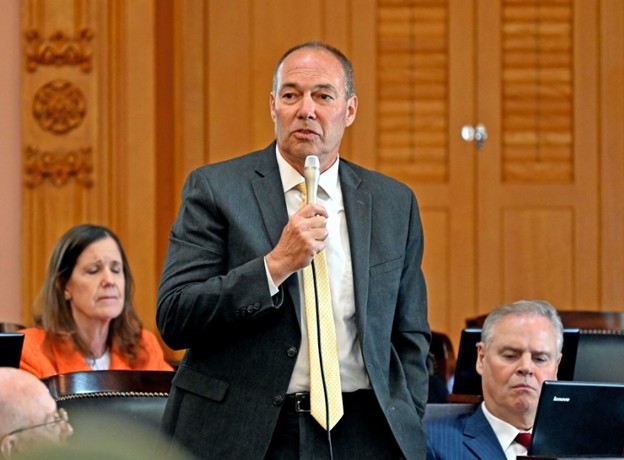
December 12, 2024
Rep. Bob Peterson (R-Sabina), a cosponsor of Ohio H.B. 503, stood before the Ohio House multiple times this year to ensure passage of the bill, which passed unanimously, 89-0, in June, followed by a 31-0 vote in the Ohio Senate in December. Supported by the Ohio Pork Council, the state’s ag commodity groups, and others, the bipartisan legislation now heads to Gov. DeWine for signing. It would prohibit importing and hunting feral swine as well as outlawing garbage feeding of pigs. Both would reduce unnecessary risks for farmers, landowners, and others.
NEW ALBANY, OHIO, Dec. 12, 2024 – In another unanimous and bipartisan vote, the Ohio Senate passed H.B. 503, known as the Feral Swine bill, 31-0 this week. This marks another milestone toward protecting Ohio agriculture against the massive disease and economic threat posed by non-native feral swine entering the state. This comes after the Ohio House voted 89-0 last June to do the same, meaning the legislation now only needs the governor’s signature to become effective.
“On behalf of Ohio’s pig farmers, landowners, and many others in agriculture, we’re very pleased with this historic bipartisan vote by both houses as we now await Governor DeWine’s signature as the final act needed to allow this much-needed legislation to become law,” said Cheryl Day, executive vice president of the Ohio Pork Council. “We want to thank the tireless efforts of our bill sponsors Rep. Don Jones and Rep. Bob Peterson, along with Sen. Tim Schaffer. They all worked hard to help us get this bill passed so that our state’s farmers have more protection against costly foreign animal diseases. The nonpartisan, broad support we’ve seen only underscores the clear need to sign this legislation into law immediately.”
Beyond the reduced risk of animal disease, Day points to the immense damage that non-native feral swine bring to Ohio’s land, crops, soil, and water, which she says alone justifies the governor’s signature of H.B. 503. She points to USDA estimates that attribute $2.5 billion of damage each year caused by wild pigs to the ag sector alone.
Earlier this year, Ohio Veterinary Medical Association Executive Director Christopher Henney said in written testimony that feral swine may carry at least 30 viral and bacterial diseases and nearly 40 parasites.
“By outlawing the hunting and importation of feral swine into the state, Ohio will continue to be a national leader in the agriculture and animal health industries,” Henney wrote. “This bill is a significant step in the right direction for Ohio, and OVMA is proud to support this effort.”
Other groups that have supported this legislation during its time in both statehouse chambers include Ohio Farm Bureau, Ohio Dairy Producers Association, Ohio Cattleman’s Association, Ohio Soybean Association, Ohio Sheep Improvement Association, Ohio Poultry Association, Ohio Corn & Wheat Growers Association, and the Ohio Forestry Association.
As one of the main voices of the Democrats who have supported the feral swine legislation, Rep. Juanita Brent (D-Cleveland) said, “This bill will help us keep ‘bringing home the bacon’ because it is proactive, not reactive for the state of Ohio. We are trying to make sure that we are setting the right standards as an agricultural state.”
Day added, “We’re now at a monumental point of bringing greater protection to our state’s livestock and crop producers, so we simply ask the governor to take the final step to make it a reality and give our farm families the extra protection they deserve.”
About the Ohio Pork Council
The Ohio Pork Council was established in 1968, beginning with nearly 800 pig farmers dedicated to the task of promoting their own product. Currently, OPC has approximately 2,500 members. Their mission is to serve and benefit all Ohio pork producers. To learn more about the Ohio Pork Council, visit www.OhioPork.org or call 614-882-5887.
# # #
Photo of Rep. Peterson to download.
